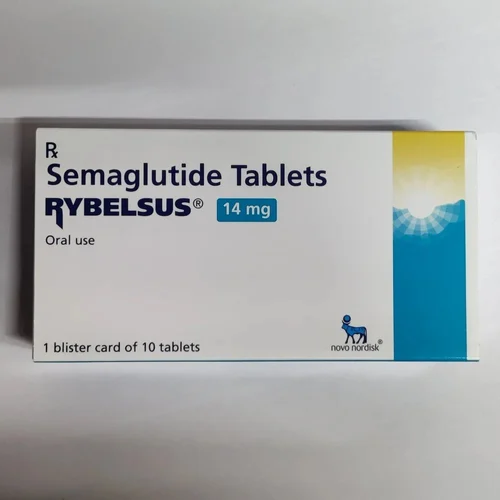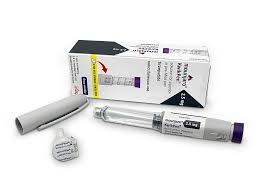Rybelsus tablets are a prescription medication used primarily to manage blood sugar levels in adults with type 2 diabetes. These oral tablets contain semaglutide, a glucagon-like peptide-1 (GLP-1) receptor agonist, which works by stimulating insulin release, decreasing glucagon secretion, and slowing gastric emptying. Unlike traditional injectable GLP-1 medications, Rybelsus offers the convenience of a once-daily pill. Approved by the FDA, Rybelsus has quickly gained popularity among healthcare providers and patients seeking a more manageable form of diabetes control.
How Rybelsus Tablets Work
Rybelsus tablets function by mimicking the action of a natural hormone in the body called GLP-1. This hormone is involved in glucose regulation, promoting insulin release when blood sugar levels rise and reducing the amount of glucose the liver produces. It also slows digestion, which helps users feel full longer, contributing to weight loss. The semaglutide in Rybelsus binds to the same receptors as natural GLP-1, effectively lowering blood sugar levels after meals and improving overall glycemic control.
Benefits of Rybelsus Tablets
One of the major advantages of Rybelsus tablets is that they provide effective glycemic control without the need for injections. This oral alternative offers a more convenient method of administration, increasing patient adherence and satisfaction. Additionally, many users of Rybelsus tablets experience modest weight loss, which is a valuable benefit for individuals with type 2 diabetes who are often managing obesity as a coexisting condition. Clinical studies have shown that Rybelsus can significantly reduce A1C levels, a key marker of long-term blood glucose control.
Usage and Dosage
Rybelsus tablets are taken once daily, at least 30 minutes before the first food, beverage, or other oral medications of the day. It is recommended to take the tablet with no more than 4 ounces of plain water. The initial dose typically starts at 3 mg for the first 30 days to allow the body to adjust, after which it may be increased to 7 mg. Depending on the patient’s response, the dose can be further increased to 14 mg. Patients should always follow their healthcare provider’s instructions regarding dosage adjustments and monitoring.
Who Can Use Rybelsus Tablets
Rybelsus tablets are approved for adults with type 2 diabetes who require improved glycemic control in addition to diet and exercise. It is not suitable for individuals with type 1 diabetes or those with diabetic ketoacidosis. Patients who have a history of medullary thyroid carcinoma or multiple endocrine neoplasia syndrome type 2 should avoid using Rybelsus, as the drug has been linked to an increased risk of thyroid tumors in animal studies. Pregnant or breastfeeding women should consult their healthcare provider before starting treatment with Rybelsus tablets.
Side Effects of Rybelsus Tablets
Like all medications, Rybelsus tablets can cause side effects. The most common side effects include nausea, vomiting, diarrhea, abdominal pain, and decreased appetite. These gastrointestinal symptoms are usually temporary and may lessen over time as the body adjusts to the medication. However, more serious side effects can occur, including pancreatitis, changes in vision, kidney problems, and allergic reactions. If any of these serious side effects are experienced, medical attention should be sought immediately. Patients should also monitor for signs of low blood sugar, especially if Rybelsus is taken with other diabetes medications like insulin or sulfonylureas.
Precautions and Interactions
Before starting Rybelsus tablets, patients should inform their doctor about all existing health conditions and any medications they are taking. Certain drugs, especially those that affect blood sugar or gastrointestinal motility, can interact with Rybelsus. Additionally, the absorption of other oral medications may be impacted due to delayed gastric emptying. It is important for patients to carefully follow timing instructions to avoid potential interactions. Rybelsus is not recommended for use in people with severe gastrointestinal disease, such as gastroparesis, due to the drug’s effect on stomach emptying.
Lifestyle Changes with Rybelsus
While Rybelsus tablets can be highly effective for controlling blood sugar, they should not be viewed as a standalone solution. Successful diabetes management involves a comprehensive approach that includes dietary modifications, physical activity, and weight control. Patients taking Rybelsus are encouraged to follow a balanced diet rich in whole grains, lean protein, healthy fats, and plenty of vegetables. Regular exercise, such as brisk walking or strength training, can further improve insulin sensitivity and enhance the effects of Rybelsus. Additionally, avoiding smoking and limiting alcohol intake are important lifestyle adjustments that support long-term health.
Clinical Studies and Effectiveness
Several clinical trials have demonstrated the efficacy of Rybelsus tablets in managing type 2 diabetes. In the PIONEER series of trials, patients treated with Rybelsus showed significant improvements in A1C and weight loss compared to placebo and other oral diabetes medications. One study found that Rybelsus 14 mg led to an average A1C reduction of up to 1.5% after 26 weeks of treatment. These findings highlight Rybelsus as a valuable tool for patients who are not adequately controlled on metformin or other oral antidiabetic agents.
Rybelsus and Weight Management
In addition to lowering blood sugar, Rybelsus tablets may help with weight loss, which is a key goal for many people with type 2 diabetes. The appetite-reducing effect of GLP-1 receptor agonists like semaglutide can support gradual and sustained weight reduction. Clinical studies have shown that users of Rybelsus lost more weight than those taking placebo. While weight loss results vary among individuals, many patients find that the combination of blood sugar control and modest weight reduction enhances their overall well-being and quality of life.
Cost and Accessibility
Rybelsus tablets are a relatively new medication and may be more expensive compared to older diabetes treatments. However, many insurance plans cover Rybelsus, and the manufacturer offers savings programs to help eligible patients reduce out-of-pocket costs. Generic versions are not yet available due to patent protections. Patients interested in starting Rybelsus should discuss cost and coverage options with their healthcare provider and insurance company to ensure access to the medication.
Final Thoughts
Rybelsus tablets represent a significant advancement in the treatment of type 2 diabetes by offering an effective oral alternative to injectable GLP-1 medications. With benefits such as improved blood sugar control, potential weight loss, and enhanced convenience, Rybelsus is an attractive option for many patients. However, like any medication, it is important to consider potential side effects, interactions, and individual health factors. When combined with lifestyle changes and ongoing medical support, Rybelsus tablets can play a key role in achieving better diabetes management and long-term health outcomes.



